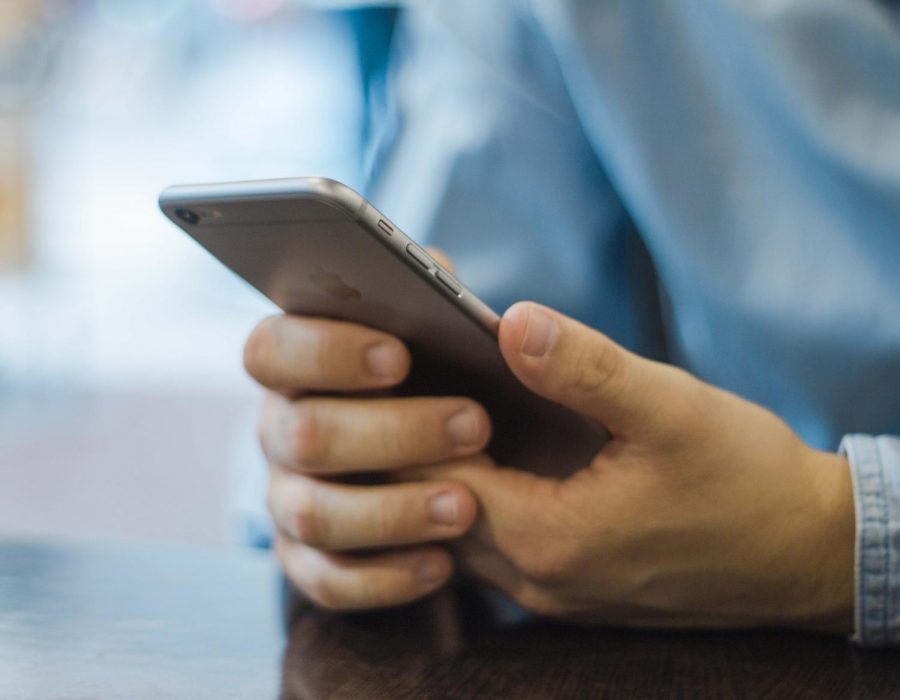Phone Psychology
Some experts are considering a possible link between increased smartphone usage and deteriorating mental well-being for young people.
Oct 23, 2017
Most college students can remember life before their first smartphone, but many students now likely can’t fathom going through life without their mobile device.
According to a 2016 study conducted by market research company dscout, the average smartphone user spends 2.4 hours per day on their phone, while the “heavy user,” the top 10 percent of smartphone users in terms of time spent on their device, is on their phone 3.75 hours per day.
The average user touches their smartphone screen 2,617 times a day, while the heavy user averages 5,427 touches a day, according to the same study
Along with this rise in smartphone use, some experts have expressed concerns that these addictive little screens are adversely impacting mental well-being.
Adam Butler, head of UNI’s department of psychology, weighed in on the issue.
“We have to realize that smartphones are a new technology. Humans have behaviors — emotions — that were adaptive hundreds of thousands of years ago,” Butler said. “Our psychology has evolved to be adaptive. But the vast number of human generations that have lived on this planet […] lived without smartphones.”
Butler went on to question the effect of connecting with one another through an electronically mediated form of communication.
“The question is, what is the consequence of that? What is the consequence of removing people from the social environment in which we evolved to exist?” Butler said. “We don’t really know the answer to that. However, we do see an explosion in the number of young people with serious psychological problems — anxiety, depression, at a rate that we didn’t used to see.
“For example, the UNI Counseling Center is completely overwhelmed, and counseling centers on college campuses throughout the United Sates are overwhelmed with students needing services,” Butler continued. “But the question is, why, all of a sudden, do we have a really strong demand for counseling services? Nobody knows why.”
A 2016 survey by the American College Health Association (ACHA) found that 17 percent of college students were diagnosed or treated for anxiety, and about 14 percent were diagnosed with or treated for depression, compared to 10.4 percent and 10.2 percent, respectively, in the ACHA’s 2008 survey.
The ACHA has also recorded an increase in attention deficit, hyperactivity disorder (ADHD) and insomnia among college students. It is unclear whether the statistics reflect a dramatic increase in mental health problems in young people, whether more young people are comfortable asking for help or a combination of both.
Butler was hesitant to directly link smartphones to the state of mental health among young people, saying, “I think it’s possible [smartphones] do [contribute to mental health problems], only because people become absorbed in their phone to the exclusion of actual social interaction.”
However, Butler later added, “There are studies showing that people who spend a lot of time on social media, Facebook, Instagram […] are more likely to be depressed. They’re more likely to feel bad about their lives.”
Butler attributed this to the “highlight-reel” effect.
“I don’t put on social media when I wake up and I’ve got a flat tire on my bike, or any other thing that’s gone wrong,” Butler said. “Most of the people […] post the positive things. They post the good picture of themselves, not the one where they look hideous. And so, you look at that and think, ‘Look at all the fun stuff that person is doing, and I haven’t left the house in three days, or I never get to do anything fun because I constantly have work to do.’”
Butler noted that the tendency of people to compare their own lives to others’ “highlight reels” on social media can make people feel unhappy about their lives, which then negatively impact their mental health.
Concern regarding the habit-forming aspects of popular technology, known as addictive feedback loops, has also grown in recent years. These addictive feedback loops include the Facebook ‘like’ button, Snapchat’s ‘snap streak’ feature and the auto play feature on YouTube and Netflix.
Nir Eyal, author of “Hooked: How to Build Habit-Forming Products,” states in his book that the addictive aspect of these features are no accident.
“The technologies we use have turned into compulsions, if not full-fledged addictions,” Eyal writes. “It’s the pull to visit YouTube, Facebook or Twitter for just a few minutes, only to find yourself still tapping and scrolling an hour later […] just as their designers intended.”
The debate over whether practices such as the “hook cycle” is good, innovative business or an unethical means of psychologically manipulating consumers rages on.
Butler said that while tech products can be “addictive” in the sense that users feel a pull to check their phone, the comparison of tech addiction to a drug addiction is not accurate.
“The same sorts of pathways may be active. It’s not the same in the sense [that] there may be a psychological dependency, but there’s not going to be a physical dependency,” Butler said. “If you’re an alcoholic […] you can’t just decide, ‘Okay, I’m not going to drink anymore.’ You will get violently and potentially life-threateningly ill. You need to go to a hospital and go through a medical withdrawal. If I stopped looking at Facebook, I’m not going to start vomiting and going into convulsions. It’s not quite the same, but the same reward pathways in the brain may be involved.”
Although smartphones have the potential to be incredibly useful devices that can improve the general welfare of society, they can also be dangerous if used improperly or excessively.
One option for users is to turn off push notifications for non-essential apps whose activity does not warrant constant attention.
Users can also delete games or apps they feel they invest too much time into and even program their phone to not download new apps.
In addition, users can choose to not take their phone to bed with them, instead leaving it plugged into a charger on the other side of the room or the other side of the house.
“People probably need to do a better job of being socially engaged in real life instead of being socially engaged through their device,” Butler said. “That would probably benefit a lot of folks.”















